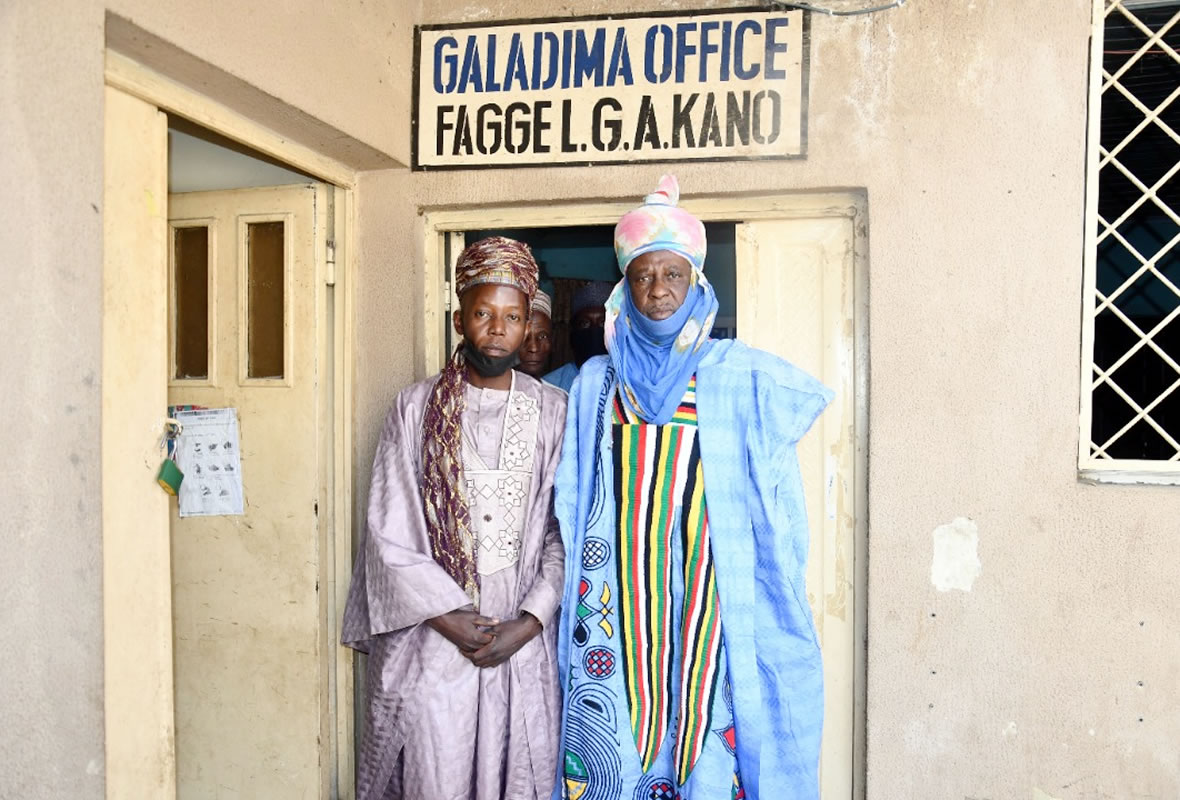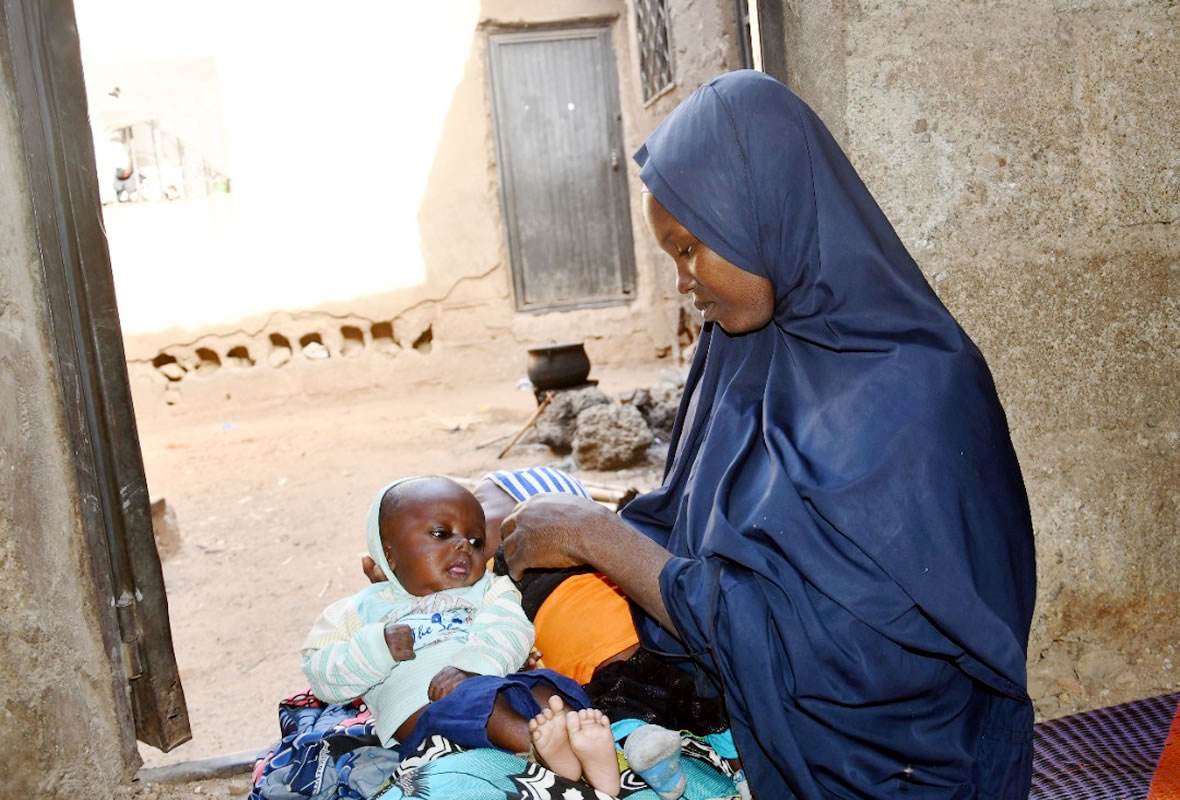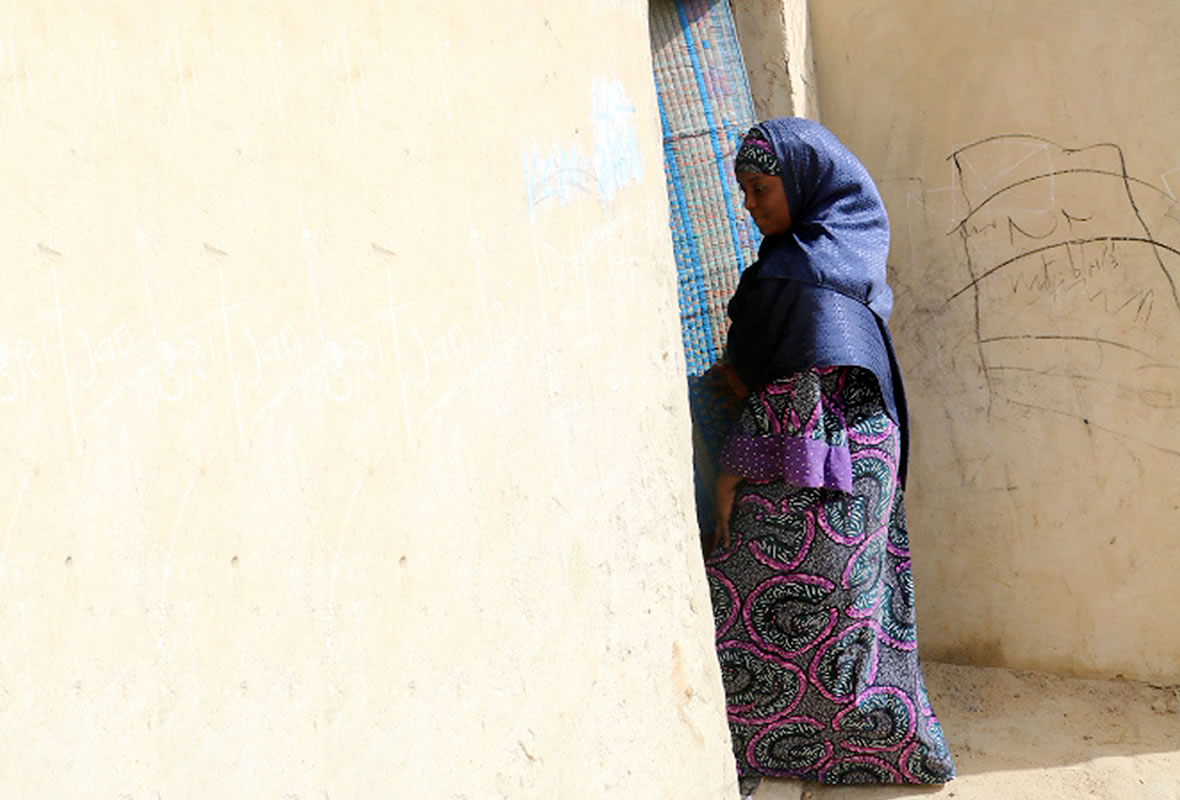Figure Above: Community Volunteer, Halima Abdulraman walking into a home to provide nutrition services in Fagge Local Government Area.
“Some women do not understand that colostrum is good for their babies. They prefer to give newly born babies goat milk. Many don’t know how to position their babies while breastfeeding. These gaps affect the health of babies,” says community health worker, Maimuna Baba.
Maimuna goes to communities in Kumbotso Local Government Area of Kano State to supervise community health workers who provide basic nutrition services and education to women and children as part of the Accelerating Nutrition Results in Nigeria (ANRiN) project. The project is being implemented by Institute of Human Virology Nigeria (IHVN) in collaboration with Kano State Ministry of Health with funding support from the World Bank in nine local government areas in Kano State.
She says that since the project started in August 2021, community health workers go from door to door to educate pregnant women as well as lactating mothers. They also give them iron and folic acid tablets as well as Intermittent Preventive Treatment for malaria.
“We give children from 6-59 months zinc/oral rehydration solution and vitamin A supplementation while children from 12-59 months are given deworming tablets,” she adds.
Maimuna works as a Monitoring and Evaluation Officer with a community-based organization, Rural-Urban Slum Development Initiative (RUSDI) engaged by IHVN to go from door to door to give basic nutrition services. IHVN also provides community nutrition services in Kano Municipal, Bukure, Wudi, Nasarawa, Gwale, Tarauni and Dala Local Government Areas. As at December 2021, more than 239,000 women and 539,000 children have received these services through the IHVN program.
Maimuna says that women are excited to receive nutrition services in the comfort of their homes. “When you go to the slums, some of them are not aware of the need to go to a health facility, some of their husbands do not allow them to go out of the house and for some who can even go to the health facilities, they cannot afford basic nutritional services for themselves and their babies,” she notes.
The volunteers do not only educate the women; they educate their husbands too.

“Some people welcome you to their homes, but others are hostile because they think that we have come to give them drugs for family planning,” says Khadija Sanni, a community volunteer in Kwachiri, Fagge Local Government Area.
Khadija meets the Village Head at such times for him to sensitize community members and let them know that the free nutritional supplements are good for their health and for their children.
Another community volunteer, Halima Abdulraman, said that the Village Head introduced them to the community. “Before, I was afraid, but when the Village Head introduced us very well to the community, I started enjoying working here. The women interact well with us, they give us food and a place to pray,” Halima said.
Community leaders are involved in promoting access and utilization of basic nutrition services for pregnant and lactating women, and children under five years in the ANRiN project.
A community leader and Ward Head in Fagge Local government, the Wakili Galadiman Fagge, Alhaji Hassan Ahmad says that the program has helped many women in his community. “We are happy that these drugs are taken to the houses of the women. The women are happy too. The project is something that we are benefitting from. We advise the women to accept the nutritional services,” he said.
Kano State ANRIN Project Coordinator, Dr Umar Yahuza, says that the state government is committed to the project. “ANRIN Project is saving our children from brain stunting, during their first 1000 days. Because of the ANRIN project, the women do not experience stock-out of nutrition drugs, they are getting basic nutrition services at home. The community health care volunteer walks into their houses to give them.”

According to the 2018 National Nutrition and Health Survey (NNHS), the prevalence of stunting in children in Kano State is 46% and only 30.3% of infants are initiated on breastfeeding within the first one hour of delivery.
“These nutrition indices demonstrated an urgent need to provide nutrition specific and sensitive interventions. IHVN is leading in the delivery of these services in Kano State. We don’t have any challenges in collaborating with IHVN to achieve ANRIN objectives,” Dr Yahuza says.
IHVN ANRIN Project Chief of Party, Dr Temitope Kolade adds that the Institute is working towards reaching more women and children with drugs for deworming of children from 12-59 months, iron and folic acid for pregnant women, intermittent preventive treatment for malaria for pregnant women and micronutrient powder for children from 6-23 months. Other basic nutrition services the Institute is providing through community-based organizations is nutrition counseling and education for pregnant, lactating mothers and caregivers, as well as Vitamin A and Zinc ORS for children from 6 to 59 months.
“The program is improving nutrition and health status of beneficiaries. With this, we are preventing malaria among pregnant women, and impacting families who cannot afford basic nutrition services,” Dr Kolade says.
30-year-old Hauwa Adam, a mother of five, is one of the beneficiaries of iron and folic acid with deworming drugs for her children. She says that her current pregnancy is the best so far. “For all my pregnancies, I am usually very weak and unable to wash, sweep and cook. I can spend all day without eating but now, I eat well, I am strong enough to do all the house work.” She is looking forward to a safe delivery of her baby.
Another beneficiary is Sha’awa Muhammad from Kumbostso Local Government. Sha’awa is a guardian of twin boys handed to her to breastfeed after the death of their mother, her sister-in-law. Sha’awa, who has a baby of her own and six children says that the nutrition support she has received has improved the health of the children. “I am able to take care of them better with the guidance of the community volunteers. Before, the twins were so thin, you could see their veins but now, they are healthier” the housewife said.

